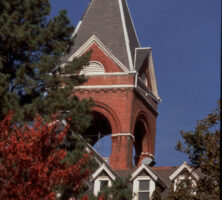Agnes Scott College, located in Decatur, just six miles from Atlanta’s city center, is an independent liberal arts and sciences college for women. The college’s mission is to educate women to think deeply, live honorably, and engage the intellectual and social challenges of their times.
In fall 2017, 937 students were enrolled at Agnes Scott. The school emphasizes its ten-to-one student/faculty ratio, average class size of sixteen, diversity, and global education. In 2017 more than half of the student body was from underrepresented groups, and 9 percent were international students.

Courtesy of Agnes Scott College
All tenure-track faculty have a Ph.D. or terminal degree in their field; approximately 60 percent are women. The college offers a bachelor of arts degree in thirty majors as well as a master of arts in teaching secondary education and a post-baccalaureate premedical program. Agnes Scott has dual degree programs with Washington University in St. Louis, Missouri, and with the Georgia Institute of Technology in Atlanta, as well as cross-registration with eighteen Atlanta-area colleges and universities.
Agnes Scott is rated consistently as one of the best women’s colleges in the country. In 2017 U.S. News and World Report ranked the school fourth among national liberal arts colleges in its “Most Innovative Schools” category and included it on the magazine’s “Great Schools, Great Prices” list. Its endowment of more than $230 million is one of the largest per student of any college or university in the country.
History
When Frank H. Gaines became pastor of the Decatur Presbyterian Church in 1888, he brought with him a strong interest in education, and he led the effort to open a school under the auspices of the church. In 1889 the Decatur Female Seminary opened with sixty-three students and four teachers. A strong supporter of this effort was church member George Washington Scott, who later donated $40,000 to provide a home for the school with the condition that the school be renamed for his mother, Agnes Irvine Scott, a Scots-Irish woman who immigrated to America as a teenager. Chartered as Agnes Scott College in 1906, the institution is affiliated with the Presbyterian Church (U.S.A.). The neighborhood in which the campus lies is listed on the National Register of Historic Places, as are some of the college’s buildings.

Courtesy of Agnes Scott College
Strengths
The first institution of higher education in Georgia to receive accreditation from the Southern Association of Colleges and Schools, Agnes Scott College dedicated itself from the beginning to the highest level of “moral and intellectual training and education.” Its emphasis on academic excellence and a rigorous liberal arts curriculum has encouraged independent thinking in an atmosphere for learning. Since the 1920s Agnes Scott has ranked in the top 10 percent of American colleges whose graduates complete Ph.D. degrees.
The college’s residential campus, prized for its aesthetic distinction and its state-of-the-art facilities, has given all student generations a sense of place, purpose, and responsibility. Student self-government under an honor code has been a hallmark since 1906. A founding member of many national and regional educational associations, Agnes Scott has been a member of Phi Beta Kappa since 1926. This tradition of educational leadership continues as the college models new forms of undergraduate education for women, including innovative science and international programs; language, technology, and speaking throughout the curriculum; and linkages to Atlanta’s university, business, and cultural communities.

Courtesy of Agnes Scott College
Agnes Scott was one of the first colleges in the nation to establish a center fully devoted to improving and enhancing students’ writing and speaking skills. Students make approximately 1,500 visits per year to the center to confer with peer tutors and to use its high-tech computers, printers, scanners, software, and audio and video playback equipment.
Recent Achievements
In 1995 the college welcomed its first alumna president, Mary Brown Bullock, a 1966 Phi Beta Kappa graduate and a respected historian of China with a Ph.D. from Stanford University in Palo Alto, California. During Bullock’s tenure the college increased its enrollment by 60 percent and completed a $120 million building program. With the opening of the $36.5 million Science Center, Agnes Scott entered a new era for science education. Housing the departments of biology, chemistry, psychology, and physics (astronomy is located in Bradley Observatory and Delafield Planetarium), the building has individual faculty research space as well as lab space for the collaborative research of faculty and students. In the Woolford B. Baker Atrium, a three-story mural of the DNA of Agnes Irvine Scott links the college’s heritage to the latest scientific research.

Courtesy of Agnes Scott College
In 2006 Bullock retired, and Elizabeth Kiss, the former director of the Kenan Institute for Ethics at Duke University in Durham, North Carolina, became Agnes Scott’s eigth president. During her tenure the school entered new partnerships with Emory University and Georgia Tech, raised more than $100 million in new funds, and established SUMMIT, an innovative curriculum emphasizing global learning and leadership development.

Courtesy of Agnes Scott College
In May 2017 Kiss announced that she would be stepping down from her post at the end of the 2017-2018 school year. After an eight-month search, the school’s board of trustees announced that it had selected Leocadia “Lee” Zak as Kiss’s successor. Before coming to Agnes Scott, Zak served as director of the U.S. Trade and Development Agency under President Barack Obama.
Outstanding Students and Alumnae
Among Agnes Scott’s outstanding alumnae are Georgia’s first female Rhodes Scholar, the first woman ordained a minister in the Presbyterian Church (U.S.A.), the first woman to chair the Federal Commodity Futures Trading Commission, the first female chief justice of the South Carolina Supreme Court, a member of the U.S. Congress, and Fulbright, Gates Millennium, Goldwater, Pickering, Rhodes, and Truman scholarship awardees.
















